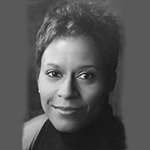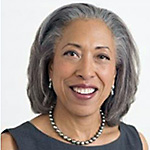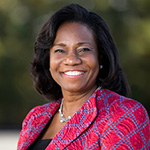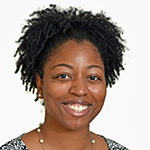Distinguished Alumni Speak at Rebecca Lee Crumpler Symposium
Speaking at a February 8 virtual symposium celebrating Rebecca Lee Crumpler, MD, four distinguished alumni reflected on their medical careers, their experiences at the School and on the personal impact of Crumpler’s legacy.
Graduating from New England Female Medical College in 1864 (which merged with Boston University in 1873 to become Boston University School of Medicine), Crumpler was the first Black female physician in the U.S. In “A Book of Medical Discourses in Two Parts,” she wrote she was driven to pursue “every opportunity to relieve the sufferings of others,” and she chose to provide treatment, particularly to women and children, regardless of their ability to pay.
But Crumpler faced racism and sexism as pharmacists refused to fill her prescriptions, fellow physicians shunned her, and she was denied admitting privileges at hospitals.
 “The fact that the School of Medicine was originally a female medical college … speaks volumes to the emphasis placed on the importance of women in medicine. And then, to have a Black woman … at the end of the Civil War who actually graduated (with a medical degree) and was the first in the U.S. … It just reemphasizes the school’s mission … in terms of understanding the importance of women, and women of color, in medicine,” said Patricia Williams, MD’89, former vice president of safety surveillance and risk management for Pfizer Pharmaceuticals.
“The fact that the School of Medicine was originally a female medical college … speaks volumes to the emphasis placed on the importance of women in medicine. And then, to have a Black woman … at the end of the Civil War who actually graduated (with a medical degree) and was the first in the U.S. … It just reemphasizes the school’s mission … in terms of understanding the importance of women, and women of color, in medicine,” said Patricia Williams, MD’89, former vice president of safety surveillance and risk management for Pfizer Pharmaceuticals.
A BU undergraduate, Williams said premed competitiveness shifted to a supportive environment once she started at medical school. While there was a fair amount of tough love, Williams said staff, faculty and students pulled together to help everyone.
 As a medical student, Nancy Roberson Jasper, MD’84, a former assistant professor of obstetrics and gynecology at Columbia University Medical Center, was impressed by the School’s emphasis on community outreach. She recalled an incident where medical students went to the home of man suffering from prostate cancer, who also was experiencing elder abuse, and brought him back to the hospital.
As a medical student, Nancy Roberson Jasper, MD’84, a former assistant professor of obstetrics and gynecology at Columbia University Medical Center, was impressed by the School’s emphasis on community outreach. She recalled an incident where medical students went to the home of man suffering from prostate cancer, who also was experiencing elder abuse, and brought him back to the hospital.
“I thought that was so courageous, and how unique that was, that we had done that for this individual,” said Jasper.
The idea of serving the community, locally and globally, was always present throughout her career, including a mission to the impoverished and war-torn West African country of Sierra Leone to investigate women’s health issues and infant mortality. She recently decided to leave Columbia University and a private practice in mid-town Manhattan for a position as an OB/GYN at the James J. Peters Veterans Affairs Medical Center in the Bronx.
“I’m going to go back to where I really feel my roots are … to get back to the community for (whom) I had gone into medicine, to take care of women who had not had the opportunities that I had … who I knew couldn’t come and see me in my own practice because they didn’t have insurance,” said Jasper.
 Jennifer H. Mieres, MD’86, dean for faculty affairs and professor of cardiology at Hofstra University’s Zucker School of Medicine, said her BU education “sparked her curiosity and made me look at medical problems … with a much more global view.”
Jennifer H. Mieres, MD’86, dean for faculty affairs and professor of cardiology at Hofstra University’s Zucker School of Medicine, said her BU education “sparked her curiosity and made me look at medical problems … with a much more global view.”
Her choice of cardiology came from the loss of her grandfather due to a heart attack. As a cardiologist, she was “intrigued by the heart and how the heart worked,” but was drawn to consider the larger issues. A third-year rotation with attending cardiologist Alice Jacobs, now professor of medicine and vice chair for clinical affairs in the department of medicine at the School, showed her that women could forge a career in what continues to be a male-dominated field. But her subsequent research work pushed her to investigate root problems – like why women with heart issues were diagnosed so much later than men – and to help write American Heart Association guidelines on how to use diagnostic technology on women.
The co-author of five books and co-producer of four documentaries including the Emmy-nominated “A Woman’s Heart,” Mieres appreciated that Crumpler’s book was aimed at making medicine understandable for the average person.
“I was inspired by my patients to translate all of the science into actionable steps,” she said. “So, I think, like Rebecca Lee Crumpler, with the intellectual curiosity and the solution-minded mindset that started at Boston University, I was able to join forces with colleagues to really help patients and people become empowered to be partners in their health.”
 Ebonie Woolcock, MD’10, MPH, assistant professor of obstetrics & gynecology, assistant dean for diversity & inclusion and director of the Early Medical School Selection Program (EMSSP), was born and raised in Boston. She was the first in three generations of her family to break the cycle of teen pregnancy and also the first to graduate from college. Her background varies greatly from the typical applicant who gains admission to medical school.
Ebonie Woolcock, MD’10, MPH, assistant professor of obstetrics & gynecology, assistant dean for diversity & inclusion and director of the Early Medical School Selection Program (EMSSP), was born and raised in Boston. She was the first in three generations of her family to break the cycle of teen pregnancy and also the first to graduate from college. Her background varies greatly from the typical applicant who gains admission to medical school.
“Having deans and faculty who recognized that my path to the School might be a little bit different, and the support for me might be a little bit different, was really, really important,” said Woolcock.
The larger social and medical issues behind teen pregnancy helped draw her into women’s health and to become an OB/GYN. The late Kenneth Edelin, MD, was a mentor and while in medical school, Woolcock found that she was particularly interested in the surgical delivery of babies by Cesarean delivery (C-section).
Woolcock recounted a difficult C-section with a medical student observing. “I said to him, ‘so that’s not normal, that’s not what we normally do.’ But his eyes were so big, and I remember having that same moment when I saw my first C-section,” she said. “My eyes (were) so big, like this is amazing. We went in the room with 1 1/2 patients, then came out with two.”
It helped her connect the direct ways in which physicians help people, regardless of their life circumstances.
“For me, it was this whole idea of intervention and public health and (that) this is really a space where I, as a Black woman, can make a difference and use my hands, and within two minutes, I can actually make a difference in someone’s life,” she said.
Woolcock saw a life lesson in Crumpler’s inherently solitary drive and perseverance, especially when facing self-doubt and the feeling you don’t belong. You need to look within, she said, and she reminds her students of the importance of self-affirmations all the time.
“In those moments, I remind myself that ‘I’m the bomb. Do you know how hard I had to fight to get here? Do you know how smart I had to be to get here?” she said. “Do you know whose shoulders I stand on? Dr. Rebecca Lee Crumpler did it, so can I.’”
Nearly all the panelists had made career moves, often dictated by life circumstances, and Jasper advised medical students not to be afraid of change.
“Be fearless,” said Jasper. “There are going to be times when things are not going to go the way you expected them to, but then, there are going to be times when you’re going to have riches beyond your belief.”
More than 190 registered to attend the virtual event sponsored by the diversity & inclusion and development office. Watch the event recording!
View all posts